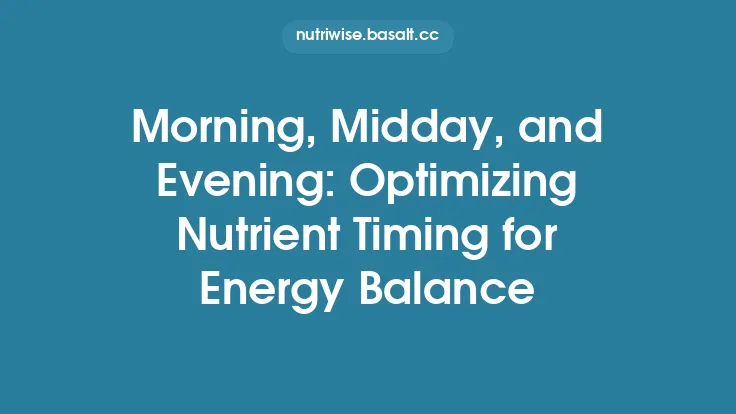The first thing most people notice when they start paying attention to their supplement routine is that the clock seems to matter. A multivitamin taken at 7 a.m. can feel energizing, while the same pill at 10 p.m. may leave you restless. This isn’t a coincidence; the body’s internal timing systems—its circadian rhythms—govern hormone release, metabolic pathways, and even the way muscles respond to stress. Aligning the intake of specific vitamins and minerals with these natural cycles can help you extract the most performance‑related benefit from each nutrient, whether you’re looking to sharpen focus for a demanding workday, power through a training session, or recover and unwind for a restorative night’s sleep.
Understanding the Body’s Internal Clock
Human physiology follows a roughly 24‑hour cycle driven by the suprachiasmatic nucleus (SCN) in the hypothalamus. Light exposure, meal timing, and activity patterns feed signals to the SCN, which in turn orchestrates downstream rhythms in hormone secretion, enzyme activity, and cellular metabolism.
- Cortisol peaks shortly after waking (the “cortisol awakening response”) and gradually declines throughout the day. This hormone supports gluconeogenesis, mobilizes energy stores, and enhances alertness—conditions that favor the action of nutrients involved in rapid energy production.
- Melatonin rises in the evening, signaling the body to prepare for sleep. Its presence dampens sympathetic activity and promotes restorative processes, creating a biochemical environment where nutrients that support relaxation, muscle repair, and nocturnal bone remodeling can be most effective.
- Growth hormone (GH) secretion is pulsatile, with a major surge occurring during deep sleep. Nutrients that influence GH pathways or provide the building blocks for tissue repair are therefore best positioned to act when taken close to bedtime.
By mapping the temporal profile of these hormonal waves, you can strategically schedule vitamins and minerals to complement the body’s natural ebb and flow, thereby enhancing performance outcomes such as cognitive sharpness, exercise capacity, and recovery quality.
Energy‑Boosting Nutrients: Best Taken in the Morning
| Nutrient | Primary Performance Role | Why Morning Works |
|---|---|---|
| B‑Complex (B1, B2, B3, B5, B6, B7, B9, B12) | Co‑enzymes in carbohydrate, fat, and protein metabolism; supports neurotransmitter synthesis | Elevated cortisol in the early day amplifies the catabolic pathways that B‑vitamins facilitate, translating into more readily available ATP for mental and physical tasks. |
| Vitamin C | Antioxidant protection; supports adrenal function and catecholamine synthesis | The adrenal glands are most active in the first half of the day, and vitamin C is a co‑factor in cortisol and adrenaline production, helping sustain alertness and stress resilience. |
| Iron (as a standalone supplement, not in a multivitamin) | Essential for hemoglobin and myoglobin synthesis; critical for oxygen transport to muscles and brain | Iron absorption is not the focus here; rather, the timing aligns with the body’s heightened demand for oxygen delivery during morning activity and training sessions. |
| Chromium | Modulates insulin sensitivity, aiding glucose uptake into cells | Morning insulin spikes after breakfast are more effectively supported by chromium, helping maintain stable blood glucose for sustained energy. |
| Coenzyme Q10 (Ubiquinol) | Mitochondrial electron transport chain component; improves aerobic capacity | Mitochondrial respiration is most active when the body is preparing for activity; taking CoQ10 early ensures it is available for ATP generation during the day’s physical demands. |
Practical tip: Pair these nutrients with a light, balanced breakfast that includes some protein and complex carbohydrates. The goal is to provide the metabolic substrates that the morning‑timed vitamins will help process, without delving into the specifics of food‑nutrient interactions.
Recovery and Relaxation Nutrients: Ideal for Evening Consumption
| Nutrient | Primary Performance Role | Why Evening Works |
|---|---|---|
| Magnesium (especially glycinate or citrate forms) | Supports muscle relaxation, nerve function, and enzymatic reactions involved in DNA repair | Magnesium competes with calcium for cellular uptake; higher nighttime levels favor the activation of the parasympathetic nervous system, promoting calm and facilitating the deep‑sleep GH surge. |
| Zinc | Cofactor for over 300 enzymes, including those involved in DNA synthesis and immune modulation | Zinc peaks in the bloodstream during the early night, aligning with the body’s repair processes. Evening intake can enhance tissue regeneration and immune readiness for the next day. |
| Vitamin D (if taken as a supplement rather than through sunlight) | Regulates calcium homeostasis, supports muscle function, and modulates immune response | Evening dosing synchronizes with the nocturnal rise in parathyroid hormone (PTH), which works together with vitamin D to fine‑tune calcium balance during bone remodeling that predominantly occurs at night. |
| Vitamin K2 (MK‑7) | Directs calcium to bone and teeth, away from soft tissues | The nighttime window of bone turnover makes this the optimal period for vitamin K2 to assist in proper calcium deposition. |
| L‑theanine (often considered a “nutrient” in the context of supplement blends) | Promotes alpha‑brain wave activity, reducing stress and improving sleep onset | Its calming effect dovetails with the melatonin rise, helping transition the brain into a restful state. |
Practical tip: Take these nutrients with a modest evening snack or a small amount of protein (e.g., Greek yogurt, a handful of nuts). The aim is to avoid a heavy digestive load that could interfere with sleep, while still providing a gentle metabolic cue for nighttime recovery.
Synergy with Exercise and Training Schedules
Your workout timing can further refine when to ingest certain supplements:
- Morning cardio or high‑intensity interval training (HIIT): Prioritize B‑complex, vitamin C, and CoQ10 to fuel rapid energy turnover and mitigate oxidative stress generated by intense effort.
- Afternoon strength sessions: A pre‑workout dose of creatine (though not a vitamin/mineral, it often appears in performance stacks) can be paired with a post‑exercise magnesium‑zinc blend to support muscle protein synthesis and reduce cramping.
- Evening yoga or low‑intensity movement: A calming dose of magnesium and L‑theanine can enhance the relaxation response, making it easier to transition into sleep after the session.
By aligning supplement timing not only with circadian rhythms but also with the specific metabolic demands of your training, you create a layered approach that maximizes both immediate performance and long‑term adaptation.
Personalizing Your Timing Strategy
While the general patterns above hold true for most adults, individual variations in sleep‑wake cycles, work schedules, and genetic chronotypes (e.g., “morning larks” vs. “night owls”) can shift the optimal windows:
- Track your natural peaks: Use a simple journal or a wearable device to note when you feel most alert, when you experience the greatest physical strength, and when you tend to wind down. Align supplement intake with these personal peaks.
- Adjust for shift work: If you work night shifts, invert the conventional schedule—take B‑complex and vitamin C at the start of your “day” (when you wake up for the shift) and reserve magnesium, zinc, and vitamin D for the end of your shift, just before you attempt to sleep.
- Consider hormonal fluctuations: Women may notice variations across the menstrual cycle. For example, during the luteal phase (higher progesterone), magnesium can be especially beneficial in the evening to counteract premenstrual tension.
- Monitor subjective outcomes: Pay attention to changes in energy levels, sleep quality, muscle soreness, and mental clarity after adjusting timing. Small, incremental tweaks often yield the most sustainable improvements.
Potential Pitfalls and How to Avoid Them
- Overlapping stimulant effects: Taking high‑dose B‑vitamins too late in the day can inadvertently boost alertness, making it harder to fall asleep. If you notice restlessness after an evening dose, shift the intake earlier.
- Competing mineral balances: Calcium and magnesium share transport pathways. Consuming large amounts of calcium close to bedtime may blunt magnesium’s calming effect. Keep calcium‑rich foods or supplements separate from your nighttime magnesium dose.
- Inconsistent timing: The body adapts to regular patterns. Sporadic intake can blunt the synchronizing effect you’re aiming for. Strive for consistency, even on weekends.
- Ignoring personal tolerance: Some individuals are more sensitive to certain minerals (e.g., zinc can cause mild nausea if taken on an empty stomach). Adjust the timing to when you can comfortably tolerate the supplement, even if it means a slight deviation from the ideal window.
Putting It All Together: A Sample Daily Schedule
| Time | Action | Supplement Focus |
|---|---|---|
| 06:30 – 07:00 | Wake, light exposure, light breakfast (protein + complex carbs) | B‑Complex, Vitamin C, CoQ10, Chromium |
| 09:30 – 10:00 | Mid‑morning snack (optional) | Iron (if needed) |
| 12:30 – 13:00 | Lunch (balanced meal) | No specific timing focus; maintain overall nutrient intake |
| 15:30 – 16:00 | Pre‑workout (if training in the afternoon) | Small dose of magnesium (to prevent cramping) |
| 18:00 – 19:00 | Dinner (protein + vegetables) | Vitamin D (if not taken earlier) |
| 20:30 – 21:00 | Wind‑down routine (reading, light stretching) | Magnesium, Zinc, Vitamin K2, L‑theanine |
| 22:00 | Lights out, sleep | No supplements after this point |
This schedule is a template; feel free to shift each block by an hour or two to match your personal routine. The key is to keep the “morning energizers” clustered early, when cortisol is high, and the “nighttime recoverers” grouped later, as melatonin rises.
By respecting the body’s intrinsic timing mechanisms and pairing them with the functional roles of specific vitamins and minerals, you can transform a routine supplement regimen into a performance‑enhancing protocol. The result is not just better energy and focus during the day, but also deeper, more restorative sleep and more efficient recovery—cornerstones of peak physical and mental performance.





